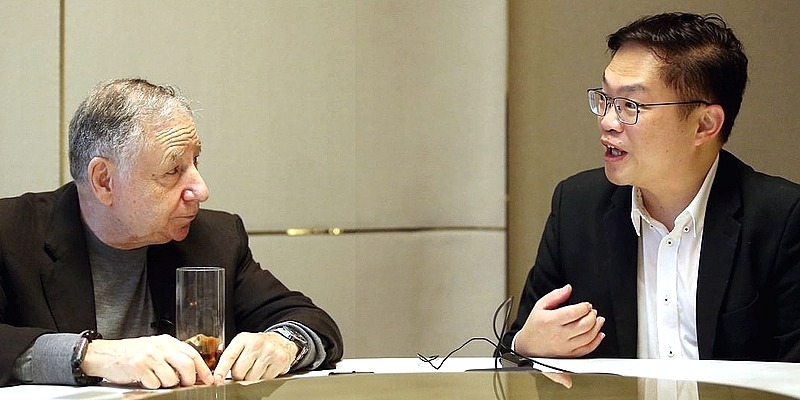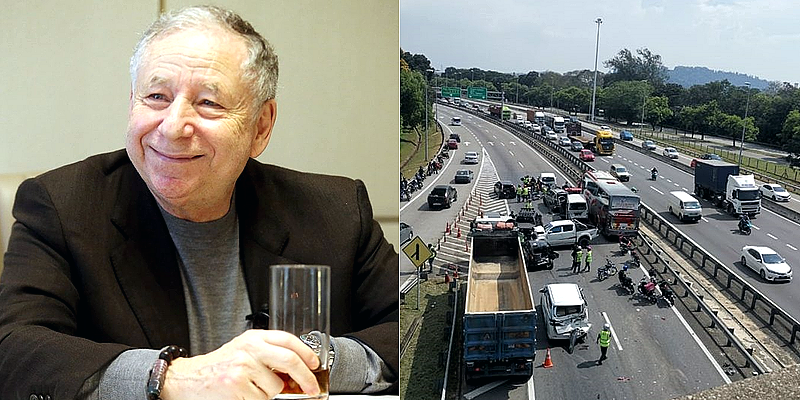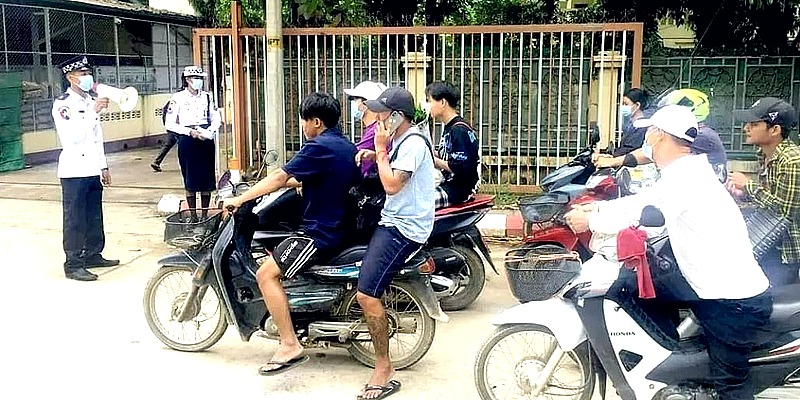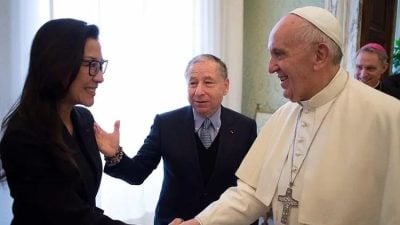In Southeast Asia, road carnage is taking place every day, says Jean Todt, the Special Envoy for Road Safety to UN Secretary-General.
Road safety awareness is lacking in Southeast Asia, he said, as some feel that road accidents are “normal.”
In an exclusive interview with Sin Chew Daily, Todt stressed that the government, private sector, non-governmental organizations, and individuals share the responsibility in preventing road carnage from occurring on a daily basis.
Compared to other Asean countries, Malaysia has more resources for road safety measures, he explained.
“You have a strong government, the Malaysian Institute of Road Safety Research (MIROS), a strong private sector, and one of the largest petroleum companies in the world Petronas.
“I feel that Petronas should do more. I have never seen their advertisements putting road safety as one of its priorities. This is what we need,” he said.
Todt, Tan Sri Michelle Yeoh’s partner, is accompanying the Oscar winner at various events in Southeast Asia.
They have visited Laos, Thailand and the Philippines. Malaysia is their last stop.
During his visit to Malaysia from April 17 to 19, Todt is carrying out the WHO’s Global Plan for the Decade of Action for Road Safety 2021-2030 with the hope of reducing the number of road accident victims by half in 2030.
He has met ministers, representatives in government agencies and non-governmental organizations as well as the private sector during his three-day stay in Malaysia.
Todt praised the contributions made by MIROS and its chairman Dr. Wong Shaw Voon by working closely with the United Nations.
He is frank in saying that MIROS needs to be given more power in Malaysia and the Asean region.
Transport Minister Loke Siew Fook’s firm stand on road safety is a positive sign, he said.
“I am very particular about the numbers. When I see 7,500 lives claimed by road accidents every year in Malaysia, a country with only a population of 32 million, I can’t be happy. I think no one is happy, too.
“To some people, this may be just a number but it may impact your life, your family and friends.
“I hope MIROS can be more influential and be given more power to improve the situation. We need to have an influential chairman together with the Prime Minister, Transport Minister, Health Minister, Home Minister and others to work collectively.
“Malaysia has proven that if the government is committed to solving a problem, it will take action,” he said.
Todt also stressed the role played by the media in increasing road safety awareness.
“This is the first thing I want to do when I arrive here – that is to accept your request for interview. I hope you (Sin Chew Daily) can deliver the message.”
Famous personalities and celebrities had also helped deliver the message, said Todt.
Todt also said that since Yeoh became the envoy for road safety to UN in 2011 and the ambassador for FIA action road safety, she has been actively promoting the WHO’s 10-year campaign on road safety to all parts of the world, including schools, in her capacity as a celebrity.

Effective enforcement for micromobility vehicles on the road
To avoid traffic jams, many cities in the world encourage people to use lightweight vehicles to improve mobility.
In Malaysia, micromoblity vehicles such as moped, electric skateboard, personal mobility aids are not allowed on public roads.
Todt said allowing the public to use such devices does not mean the public can enjoy complete freedom. The government should draft stringent regulations and enforcement for users to be aware that they will face the penalty for flouting the regulations.
There may be cases of drunk users riding skateboards, moped users without helmets which are dangerous for themselves and others.
“This requires clear and effective enforcement. Imagine if you want to achieve success, you will need to be disciplined, organized and need to have a set of minimum thresholds for the rules,” he said, adding that these are the suggestions for Malaysia.
Northern European countries are good examples, he said, as the people adhere to regulations using micromobility devices.
They will opt to take Grab or ensure that at least one in the group is sober after a drinking session.
“This is called discipline. Road accidents can happen within a short distance, such as after you step out of a pub or are only three kilometers from home. Or you want to be home as soon as possible. However, accidents take place at this moment,” he said.
Road safety campaign throughout the world to save more lives
Many remember Todt, 76, as the former chief executive officer of Ferrari, the Scuderia Ferrari Formula 1 team principal and former president of the FIA (Fédération Internationale de L’Automobile).
When he was young, Todt was a rally co-driver and held various management positions in racing teams. He assisted the Ferrari team to win many world championship titles.
In the past, countless accidents took place at the racing track. Some racers have quit due to injuries while some lost their lives.
As he had witnessed friends killed in road accidents, Todt realized that a higher standard of safety system, better road planning and road safety education are required to save more lives.
The emphasis he has on road safety issues is related to his life experience.
“I’ve had some successful careers and very often I was facing accidents. So, number one, I wanted to contribute to making racing much safer. And when you see Formula One, you know, in the 70s, 80s, 90s, every year you had two, three, four drivers dying or getting hurt. Now, since 1999, 2020, 2023, only one fatality,” he said.
Todt was appointed the envoy for road safety to UN on April 29, 2015 and he wanted to take more actions on road safety campaigns and support his partner Yeoh as the road safety ambassador through his influence at international level.
“My role is to ensure more attention is given to road safety, and more action is taken to reduce the number of casualties.
Todt pointed out two road safety issues which needed to be resolved, stringent yet effective enforcement and education on road safety.
“If Malaysians do not drive after drinking, do not swipe phones while driving, abide by the speed limit, fasten safety belt and wear helmet, the number of casualties can be reduced by half each year.
“You are responsible for your life and also the lives of other road users,” he said.
Human behaviors are the No 1 killer for road safety. According to statistics, more than 80% of the road accidents are caused by man-made errors, followed by other factors such as car performance and road design.
This is also the reason why self-driving cars are widely promoted now as such cars do not involve human behaviors.
Compared to other countries such as Thailand, Vietnam, Cambodia and Nepal, Todt is of the view that self-driving cars can be launched in Malaysia earlier.
Before self-driving cars become popular, human behaviors leading to road accidents should be prioritized on the national agenda.
“Sometimes I see motorcyclists wearing face masks but not helmets. I am close to going crazy. I am upset too!
“As I have said, people do not realize that this is not right,” he said.
People wear face masks to prevent themselves from getting infected with Covid-19, but they are not self-disciplined to wear helmets to protect their lives on the road.
“Many assume that they will be home safely at night. Unfortunately, about 1.3 million people in the world do not make it back home every year while another three to five million people suffer from permanent disability due to road accidents,” he said.
Unlike the coronavirus, Alzheimer’s or Parkinson’s disease, Todt said the United Nations have many solutions for road safety.
“We know what to do but never receive sufficient attention or worse, being ignored,’’ he said.
Todt added that besides the government, road users including pedestrians, cyclists, motorcyclists and drivers must be aware of road safety to achieve the goal of halving road accident victims by 2030.

Underfunded UN Road Safety Fund
Formed in 2018, the UN Road Safety Fund is currently supporting 25 projects in 30 medium- and lower-income countries.
Todt is of the view that the fund needs more participation and contribution from the private sectors and countries.
“We need more funds. This is the need throughout the world. To some poor and developing countries such as Sri Lanka, Nepal, Bangladesh and others, road safety is an issue.”
Nevertheless, Todt said the organization received support from World Bank and Asian Bank.
He feels that more attention should be given to driving license matters, as only 20% of drivers in the world actually hold valid driving licenses.
For others, they are driving without driving licenses and nobody would say anything, he lamented.
“You know, if they stop me in Switzerland, where I live, without a valid driving license, I will go to jail. If they catch me 10 kilometers over the speed limit, they will take my car, and I will have $2,000 to pay, with my driving license suspended for two years.
“So clearly, I will not dare to do something. But if I am here, I know nothing will happen. I will not bother,” he said.
Road safety a prioritized issue in Asean
Todt hopes the global road safety issue can be given a more prominent position in the Asean agenda by prioritizing it.
This was also the issue he brought up for discussion in Laos, Thailand and the Philippines.
“Unfortunately, I do not think the issue receives adequate participation at Asean level. When we discuss climate change and other important issues, road safety should also be included,” he said.
According to World Health Organization figures, the casualty rate of road accidents in Southeast Asia is 20.7 people out of 100,000 people, slightly lower than Africa of 26. By comparison, the casualty rate in Europe is only 9.3 people out of 100,000 people.
“Take Malaysia for example, of the 33.2 million population here, about 7,500 people are killed in road accidents every year. For France, with a population of 65 million, 3,200 of them die in road accidents. This means the casualty rate in Malaysia is four times higher than France,” he said.
Road accidents a high cost for the country
Road casualties are expensive for the country costing about 5% of the GDP as the cases involve the people’s life, family cost, society cost and also administrative cost, said Todt.
Promoting road safety should be carried out through various channels involving education, law enforcement, level of vehicles, level of roads and quality of post-crash care.
Todt said he noticed that publicity and communication are both lacking in Southeast Asia where people see rampant road accidents as “normal.”
“People do not realize that it is not right for three or four people to sit on a motorbike.
“We need a wake-up call,” he said.
“A more structured plan should be in place or people will continue to risk facing carnage on the road,” he said.
Many non-governmental organizations decide to engage in road safety to prevent road accidents and save lives. Do not think of road safety after the occurrence of road accidents, he said.
Each year, about 1.3 million people are on the road, whereas 92% of the accidents occur in medium- and lower-income countries, said Todt, who visits many countries each year.
On the collaboration between MIROS and the United Nations, Todt is optimistic. He hopes MIROS is given more power to resolve road safety issues in Malaysia and the Asean region.

ADVERTISEMENT
ADVERTISEMENT








































